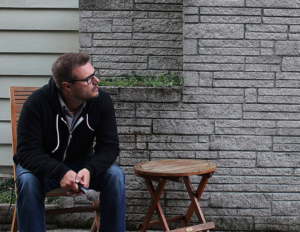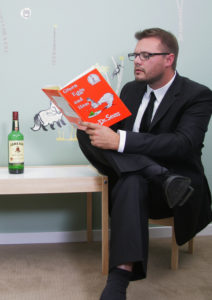Air-Raid Shelter: An interview with podcast host Aaron Roden.

Aaron Roden is the kind of guy who’s incredibly easy to bullshit with over beers. Affable, unpretentious, and funny, he possesses a gift for talking—and listening—to relative strangers. And often, those relative strangers open up in unexpected ways. That unique gift’s enabled the veteran podcaster to carve out a distinctive and steadily-growing niche.
Roden’s shepherded dozens of lively conversations as host and one-man band for his Air-Raid podcast. He’s chatted up everyone from musicians to actors to stand-up comics, employing a casual and engaging style of inquiry that occupies a sweet spot between human-interest journalist, down-to-Earth family guy, and fanboy. It’s resulted in absorbing, sometimes hilarious, and often enlightening listening, whether the one-on-one subject is Pearl Jam’s Mike McCready, Full House alum Bob Saget, or a lesser-known musician that’s currently on Roden’s radar.
Today, Monday June 27, the 300th episode of Air-Raid hits the podcast airwaves, so I sat down with Aaron Roden in his small home studio a week prior, to bullshit about this milestone (and some of his favorite moments leading to it) over bourbon-and-Diet-Cokes.
What’s coming up for Episode 300?
It’ll be a bit over an hour. It’ll be kind of a retrospective show similar to the ones we did for the 100th and 200th episodes. We’ll do clips of [highlights] set to music, then it’ll be a great conversation with none other than Sam Beam of Iron and Wine.
You do most of your interviews here at home, don’t you?
I would say it’s about 50/50 now. With a lot of touring musicians, it’s a lot easier for me to go to them so I’ll go to a venue. If it’s local people, they usually come here.
You’ve got a list of some of the most memorable podcasts in front of you…
Yeah. Did you want favorite moments, or memorable ones? I made a list of the most memorable…Some of them are bad, and some of them are good. A lot of the ones that really stand out are the ones that I either had a lot of anxiety about, or the ones that just went fucking haywire [laughs]…
[Hear the ‘single mix’ of Air-Raid’s 300th episode highlights here.]
We can talk about both. Let’s go glass-half-full and talk about one that was good-memorable.
Well, the first one on my list is one that I’d been working on for about two years to line up. It was Duff McKagan, the original bass player and founding member of Guns n’ Roses. That interview happened at Benaroya Hall for the Mad Season reunion show. I was setting up, and I’m shaking because Mike McCready’s there, and Chris Cornell’s shown up. These guys are, like, some of my childhood heroes. Then Duff shows up. He’s super-nice and super down-to-Earth, and we just chat. At one point, Chris Cornell walks past the doorway, and he flips off Duff and me repeatedly, just trying to mess up Duff. That was surreal.
 One that I’d imagine is on your list is your conversation with Ishmael Butler from Shabazz Palaces. After listening to that one I was like, “Now I really feel like I know this guy.”
One that I’d imagine is on your list is your conversation with Ishmael Butler from Shabazz Palaces. After listening to that one I was like, “Now I really feel like I know this guy.”
That one is on my list. I was really, really nervous about that one. I’ve always thought of myself as kind of a dummy when it comes to speech and writing, and Ish is an extremely intelligent fella, scary-smart.
He strikes me as being a genius, and a genius who doesn’t suffer fools gladly.
And that’s the other part, because a lot of people who are highly intelligent, don’t [laughs]. But I had an in. His producer Erik Blood is a good friend of mine. He came over with Ish and actually sat in. That was a calming mechanism for me, and I think for Ish as well. After the recording stopped, Ish said, “I think that’s the most fun interview I’ve ever had.”
Most of your interviews are in-person, but you’ve done a few by phone. A lot of interviewers aren’t so fond of phoners. How do you feel about them?
I’ve never really liked doing phoners, so when I started out doing phoners it just seemed so wrong to me. I’ve had a couple of really good phoners, like Soup from Jurassic 5. That one was amazing. But one of the most memorable ones, in a good way, was the one with Bob Saget. He made me so comfortable over the phone. And almost immediately my fear of talking to a celebrity like that melted away.
He invited my wife and me to the live show at the Moore here in Seattle, because he wanted to meet me. Bob bee-lines through this sea of radio people, and comes over and shakes my hand and says, “Thanks. That was a really great interview. Thank you so much!” And it was a phoner.
As I’m telling that story, it feels very self-serving. And I’m completely aware of that, whoever’s reading this.
Humblebrag, humblebrag.
No, it’s not even humblebrag, though! I’m extremely proud of what I’ve been able to accomplish with this. It feels a little weird to say something like that, especially when you’re just talking to a famous person. I get it.
But you’ve discovered a niche that I think is sort of an art form, which is having a really comfortable, long chat with someone who happens to be famous, and drawing something out of ‘em that you haven’t heard before.
It took me some time to realize that what I was doing was different. I mean, I’ve had some really bad interviews [laughs], but there have been tidbits in each one that are very unique. I’ve always been good with just picking up and talking to somebody, and it’s been real cool to find that people actually enjoy that. I like finding out about the real person, and not just the crib notes you get in most interview circumstances.

Do you listen to your previous shows at all?
I do now. I used to not do it, because it was like listening to myself sing. Now I kind of force myself to do it, so I can remember the entire conversation for posting it online, and just learning from my mistakes. I think that’s been a big part of how I’ve been able to improve the show over the last couple of years.
I see The Dead Milkmen on your list. What was that episode like?
That was a dream come true. I have been a fan of the Dead Milkmen for so many years.
I reached out directly to Rodney Anonymous, the lead singer, and amazingly, he was totally into doing it. I don’t know what’s going on in that guy’s head, but it is crazy. I just want to jump in there and see the colors that are flashing in his mind.
What episode had the broadest reach for you?
I think as far as downloads go, probably the Mike McCready one. He was nice enough to really push it on social media. They posted it on Facebook and Twitter, which was super-nice. That one ended up on the front page of iTunes. A lot of people listened to that one.
Are there any episodes that are kind of overlooked gems for you—episodes that haven’t gotten an enormous amount of hits, but that you think are really worth checking out?
I’d say the Ishmael Butler one. I thought it’d get more play. It’s fascinating and super-fun. The Soup interview from Jurassic 5. And most recently, Lyrics Born, he’s a hip-hop guy from San Francisco. We got into it—the origins of hip-hop, and it touched on the racism he’s had to deal with. He was unsellable because he wasn’t white, and he wasn’t black. I thought that was a really poignant part of that conversation. That is fucked up, because he is so good.
Are there any big gets who you are on your interview Wish List?
One of the people that I’d love to get on the show would be Krist Noviselic from Nirvana. I feel like there’s a serious lack of interviews about him and his life. Whenever he does an interview, it’s usually about his relationship to Kurt Cobain. And you never hear anybody talk about Krist. He never talks about how he got started, how he got into politics.
Any advice for beginning podcasters?
You have to be extremely consistent if you want to gain some listenership. Also, don’t be afraid to promote yourself, whether that’s on your personal Facebook page, or Twitter, or anywhere on social media. Don’t feel weird about it: Everyone’s doing it. And if you’re proud of what you’re doing, then tell people about it.
Hear the 300th episode of the Air-Raid podcast here.